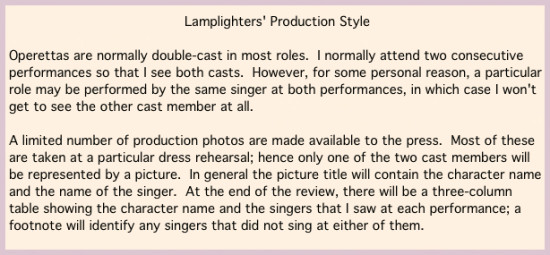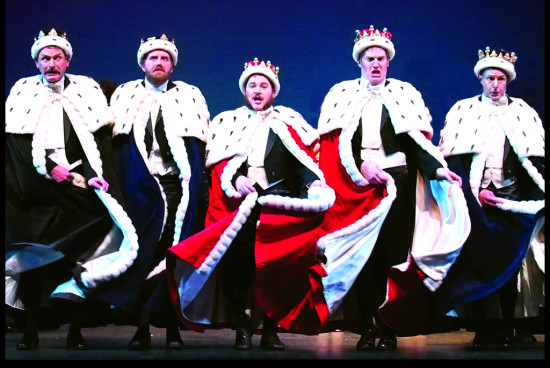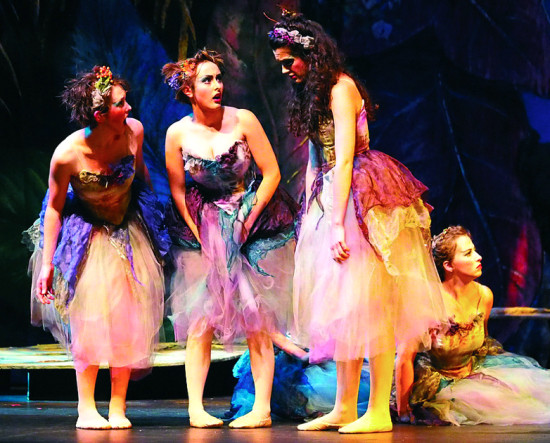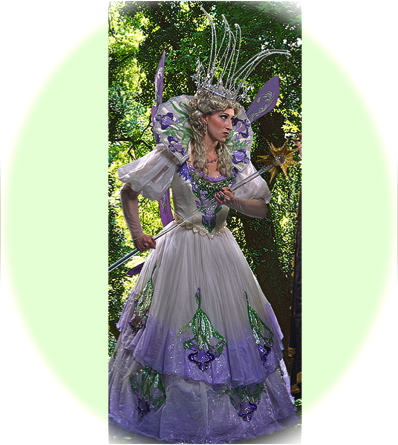Iolanthe is one of my favorite G&S operettas – in fact today, Sunday August 11 2013, with my mind reeling with scenes, music, and words from having attended the Lamplighters’ performance of this masterpiece both last night and this afternoon, I would rank it #1. I’ve never sung in a performance of it, and I’ve probably only seen it a half-dozen times, starting with the D’Oyly-Carte production way back when I was in high school. But I know it so well that I found myself (sub-vocally) putting words to most of the airs in the overture.
My memory of that D’Oyly -Carte performance is dim with age, and my memories of specific other performances is mostly non-existent, but I can’t imagine than any of them were better than the one I just saw.
I would give a grade of A+ to almost every aspect of the production, starting with the overture – in fact to the orchestra in general, ably led, as usual, by Baker Peeples. Next, to the sets by Scenic Designer Jean-Frané§ois Revon, particularly the slightly surrealistic one for Act II.
Thanks to Director Barbara Heroux and Choreographer F. Lawrence Ewing, the motion about the stage was in perfect harmony with the words and music, starting with the opening tableaux as the curtain went up. We see 15 fairies all standing stiffly in identical attitudes with one hand outstretched and wooden expressions. As the orchestra plays on into to their opening number they shift in unison from one attitude to another moving first the one arm, then both, then their heads and ankles, their faces and bodies gradually relaxing. As they begin the first chorus of their opening number
Tripping hither, tripping thither,
Nobody knows why or whither;
We must dance and we must sing
Round about our fairy ring!
they move naturally into appropriate dance movements. Meanwhile, Fleta, the 16th (and apparently newest) fairy, who arrived late and sat at the side until the attitudinizing was finished, has joined the dancing.
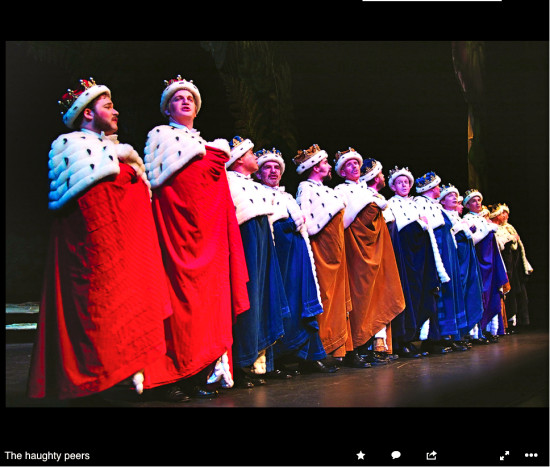
The haughty peers; far L (in red): Michael Desnoyers as Lord Tolloller and Robby Stafford as Lord Mountararat
Many G&S operettas have a distinctive Men’s Chorus who make an impressive entrance, but none can match the procession of haughty peers as they first march on to the spirited:
Bow, bow, ye lower middle classes!
Bow, bow, ye tradesmen, bow, ye masses!
Blow the trumpets, bang the brasses!
Tantantara! Tzing! Boom!
We are peers of highest station,
Paragons of legislation,
Pillars of the British nation!
Tantantara! Tzing! Boom! Tzing! Boom!
Tantantara! Tzing! Boom!
And now I must explain why I qualified my A+ grade with by saying “almost every aspect.” The ideal G&S production must take the original libretto and lyrics seriously, no matter how inane they may seem. The humor, the satire, the parody are all there in Gilbert’s words. If you burlesque them, you may gain some cheap laughs from the audience, but they come at the cost of losing concentration on the often subtle humor of the original.
However, a clone of a successful performance a century ago, might be far from successful today. Some of the humor is dependent on topical references or on subtleties of British 20th century culture that would be lost on a 21st century American audience. Also, I think it is a safe generalization to say that modern audiences have a shorter attention span than our grandfathers did.
The director thus faces two conflicting requirements. OK to make small changes in dialog and even lyrics, but they must always maintain the mood of the original. Not OK to make alterations that violate the mood. It’s a fine line that separates the two, and different directors may well disagree on exactly where to draw it. I imagine that Director Barbara Heroux would agree with my generalizations above and has drawn her line in accord with them.
In Act I, I fully agree with her. The antics she has prescribed for Fleta – sometimes late with an entrance; frequently confused about an exit and scurrying off stage just a beat two late are a perfect example. Some of the ballet formations engaged in by the peers are perhaps a bit further out, but since they are executed with perfect solemnity they are still on the safe side.
However, there two (and only two) instances in Act II where she oversteps my line. While the Fairy Queen is singing her lovely aria
Oh, amorous dove!
Type of Ovidius Naso!
This heart of mine
Is soft as thine,
Although I dare not say so!
Fleta, Leila, and Celia have cast a spell on Private Willis (object of the Fairy Queen’s secret passion) causing him to put down his gun, walk trance-like across the stage, kneel at her feet, and reach up to kiss her hand. She finishes the aria, sees Willis for the first time, and exits rapidly in confusion. The fairies run off laughing, Willis comes to, obviously disconcerted, snatches his gun from Fleta, and stalks disgustedly off stage.
The other more egregious example occurs earlier during the cute scene where the fairies are flirting with the peers and Leila is singing her verse:
In vain to us you plead–
Don’t go!
Your prayers we do not heed–
Don’t go!
It’s true we sigh,
But don’t suppose
A tearful eye
Forgiveness shows.
Oh, no!
We’re very cross indeed–
Yes, very cross,
Don’t go!
As she sings, “very cross,” she paddles Lord Tolloller with her bare hand while he conveniently bends slightly and raises his coattail to assist her. In my opinion, Gilbert would never have agreed to that action. Gilbert’s humor is subtle and appealing to the intelligence, as opposed to slapstick comedy, which is obvious and physical. I can define my line between these two types of humor quite simply, albeit retroactively. If a particular antic inspires some isolated chuckles from the audience, then it’s OK; if it inspires a mass roar of belly laughter, it has gone too far.
Enough, already. The two transgressions pale into insignificance compared to all that is right in the performance. All of the singing and acting are excellent and fit in with Gilbert’s witty words. I could happily quote you lyrics from song after song, along with snippet after snippet of clever dialogue, but that is hardly practical. If you’d like to read more than the small samples here, I refer you to the free Gutenberg website. But there are a couple of specifics that I simply must mention.
There is an emotional depth to Iolanthe that is not present in the other G&S operettas (with the exception of Yeomen of the Guard), and the Lamplighters production really brings that out. Strephon and Phyllis have pled with his mother:
STREPH. I forgot him! Mother, none can resist your fairy eloquence; you will go to him and plead for us?
IOL. (much agitated). No, no; impossible!
STREPH. But our happiness–our very lives–depend upon our obtaining his consent!
PHYL. Oh, madam, you cannot refuse to do this!
IOL. You know not what you ask! The Lord Chancellor is–my husband!
Iolanthe reluctantly agrees and, wearing a veil to conceal her identity, kneels before the Lord Chancellor in the moving ballad:
He loves! If in the bygone years
Thine eyes have ever shed
Tears–bitter, unavailing tears,
For one untimely dead–
If, in the eventide of life,
Sad thoughts of her arise,
Then let the memory of thy wife
Plead for my boy–he dies!
He dies! If fondly laid aside
In some old cabinet,
Memorials of thy long-dead bride
Lie, dearly treasured yet,
Then let her hallowed bridal dress–
Her little dainty gloves–
Her withered flowers–her faded tress–
Plead for my boy–he loves!
The Lord Chancellor is visibly moved by this plea and wipes a furtive tear from his eye before replying. He is not the only one! I know this operetta. I know what the ending will be. But Iolanthe’s plea is so sincere, so timeless in its appeal, that I suspend all this knowledge and surrender to the seemingly inevitable tragedy.
The emotional temperature continues to rise during the ensuing exchange, which is written as dialogue but is sung or spoken to music. After each sentence by Iolanthe, the fairies sing a mournful chorus from off stage, the effect of which is enhanced by amplification through an echo chamber. Amplification is normally an operatic no-no, but in this case it gives the words an eerie, supernatural significance.
The Lord Chancellor has just denied Iolanthe’s plea with “Learn thou that Phyllis is my promised bride:”
IOL. My doom thy lips have spoken–
I plead in vain!
CHORUS OF FAIRIES (without). Forbear! forbear!
IOL. A vow already broken
I break again!
CHORUS OF FAIRIES (without). Forbear! forbear!
IOL. For him–for her–for thee
I yield my life.
Behold–it may not be!
I am thy wife.
CHORUS OF FAIRIES (without). Aiaiah! Aiaiah! Willaloo!
LORD CH. (recognizing her). Iolanthe! thou livest?
IOL. Aye!
I live! Now let me die!
(Enter Fairy Queen and Fairies. Iolanthe kneels to her.)
QUEEN. Once again thy vows are broken:
Thou thyself thy doom hast spoken!
CHORUS OF FAIRIES. Aiaiah! Aiaiah!
Willahalah! Willaloo!
Willahalah! Willaloo!
QUEEN. Bow thy head to Destiny:
Death thy doom, and thou shalt die!
CHORUS OF FAIRIES. Aiaiah! Aiaiah!
Willahalah! Willaloo!
Willahalah! Willaloo!
And, on the remote chance that you don’t already know how this all turns out, I’ll stop right here with a very strong recommendation that you hie yourself to San Francisco this weekend and/or to Livermore a week later and experience Iolanthe for yourself:
415-978-2787 · ybca.org
Friday, August 16 – 8:00 PM
Saturday, August 17 – 2PM & 8PM
Sunday, August 18 – 2PM
925-373-6800 · bankheadtheater.org
Saturday, August 24 – 8PM
Sunday, August 25 – 2PM
Willahalah! Willaloo!
Principal Cast
| Role | Saturday | Sunday | * |
| Phyllis: | Alexandra Sessler | Elena Galvé¡n | |
| Iolanthe: | Molly Mahoney | Michele Schroeder | |
| Fairy Queen: | Cary Ann Rosko | Cary Ann Rosko | Sonia Gariaeff |
| Celia: | Stephanie Dietz | Stephanie Dietz | Lizzie Moss |
| Leila: | Katelyn Neumann | Maayan Voss de Bettancourt | |
| Fleta: | Heather Tinling | Susanna Ketron | |
| Lord Chancellor: | F. Lawrence Ewing | Rick Williams | |
| Strephon: | Samuel Rabinowitz | Samuel Rabinowitz | John Melis |
| Tolloller: | John Brown | Mike Desnoyers | |
| Mountararat: | Robby Stafford | William Neely | |
| Private Willis: | Sean Irwin | Wm. H . Neil | |
| * Did not perform in Mtn. View | |||
All quotes are from The 14 Gilbert and Sullivan Plays, available at the free Gutenberg website
Except as noted, photos are by Lucas Buxman
Photo arrangements and cropping by Philip Hodge
P. S. I found out an interesting fact when talking with Rick Williams (the Lord Chancellor) after the Sunday performance. One of the chorus members had become suddenly unable to perform over the weekend. Rick had volunteered to take his part Saturday, and Saturday’s Lord Chancellor, E. Lawrence Ewing, took it on Sunday. It says something about the Lamplighters company when the star of the show is willing to appear, unannounced, as an anonymous Peer on his night off. I suspect that such teamwork is an important reason why the Lamplighters put on such great performances, time after time.
This review by Philip G Hodge appeared in sanfranciscosplash.com on August 14, 2013.

